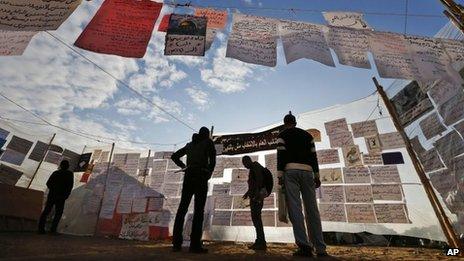Egypt opposition calls for protests against referendum
- Published

Egypt's opposition has called for mass protests after Islamists claimed voters had backed the draft constitution in the first round of the referendum.
The National Salvation Front urged people to "take to the streets on Tuesday to defend their freedoms, prevent fraud and reject the draft".
The coalition said "irregularities and violations" marred voting on Saturday.
Earlier, President Mohammed Morsi's Muslim Brotherhood said 57% had voted "yes", citing an unofficial tally.
The result will not be known until after this Saturday's second round.
The opposition had demanded the referendum be postponed because the constituent assembly had approved the draft charter despite a boycott by liberals, secularists and Christians, who complained it did not adequately protect women, freedom of expression or religion.
'Last chance'
On Sunday evening, the National Salvation Front urged the organisers of the referendum to consider re-running the first round, during which it said thousands of violations had been reported by civil society groups.
They said the violations included polling centres collecting votes without judges to oversee the process, civil employees illegally replacing the judges, ballot papers not being officially stamped, campaigning inside polling stations and Christian voters being turned away.
The coalition called on Egyptians to protest in Cairo's Tahrir Square and other locations across the country on Tuesday to bring down the "invalid draft constitution".
It also dismissed the Muslim Brotherhood's claim that its tallies showed nearly 57% of voters had voted "yes" on Saturday in 10 of the country's 27 provinces, including Cairo and Alexandria.
The Islamist movement, which has in the past accurately predicted election results, said it estimated turnout had been 32%. If confirmed, that would be far lower than in the parliamentary and presidential elections that followed the fall of Hosni Mubarak.
Mohamed ElBaradei, the co-ordinator of the National Salvation Front and former head of the UN's nuclear agency, on Monday renewed his call for Mr Morsi to shelve the referendum and hold talks with the opposition.
"Last chance: cancel the ill-reputed referendum and begin a dialogue to close the rift, and [appoint] a capable technocratic government that can administer and bring back the state of law," he wrote on Twitter.
Protests by opposition supporters have already forced the president to rescind a controversial decree that gave him extensive new powers.
He also offered an arrangement for his opponents and allies to negotiate amendments that would be added to the constitution after the referendum.
However, he refused to postpone the vote, saying it was a vital step towards the transition to democracy.
If the constitution passes, elections must take place within three months. In the meantime, legislative powers would remain with Mr Morsi.